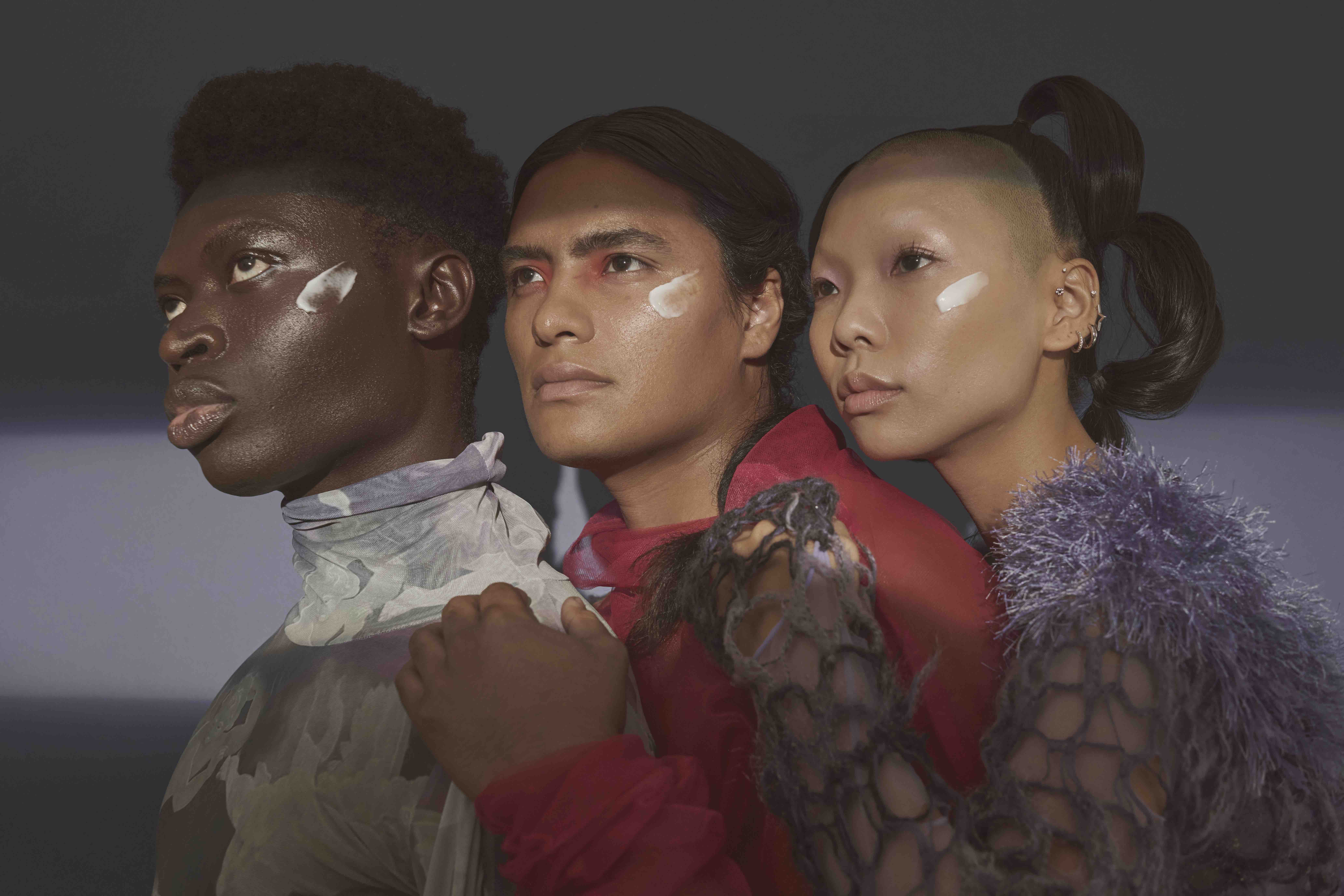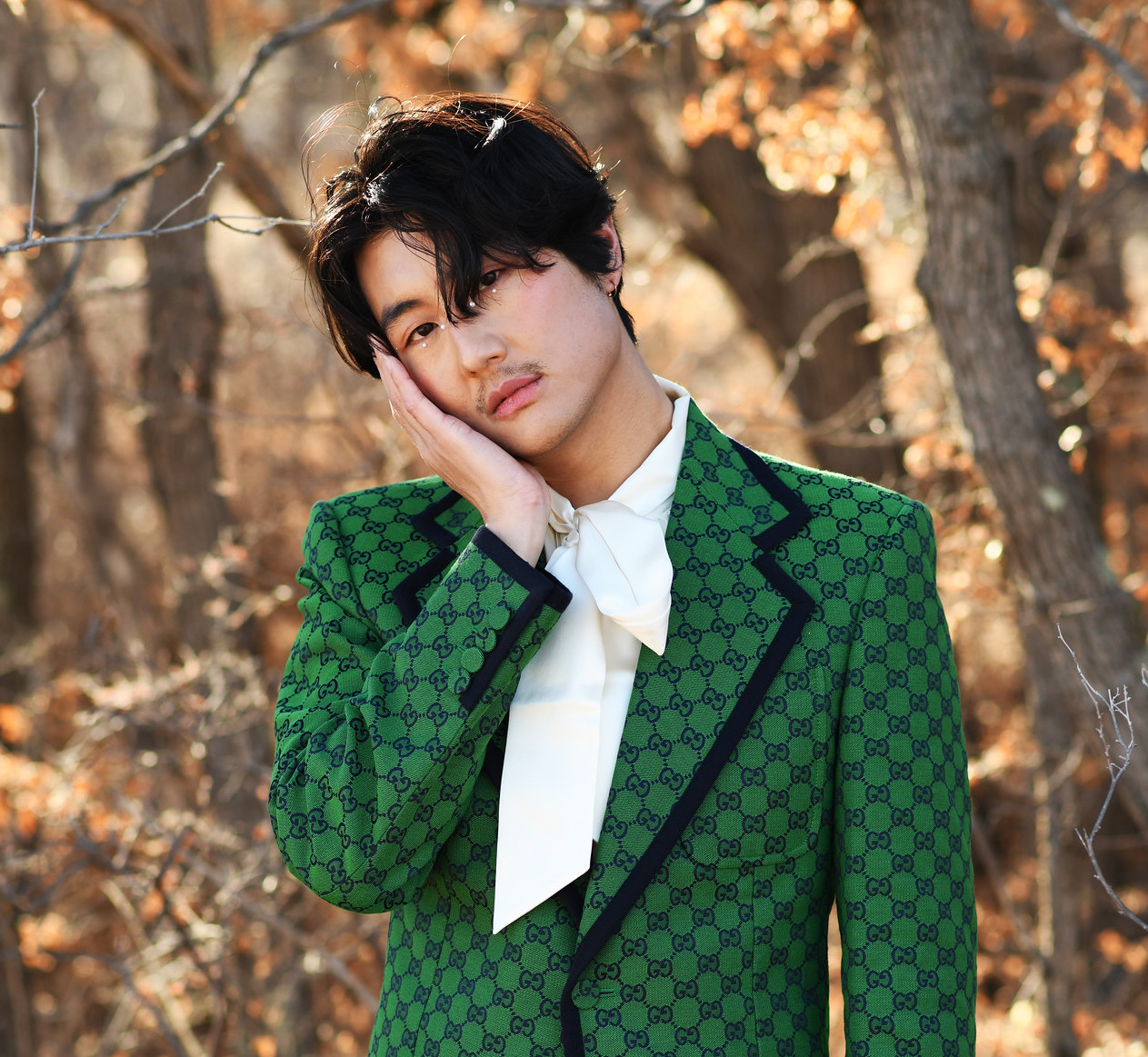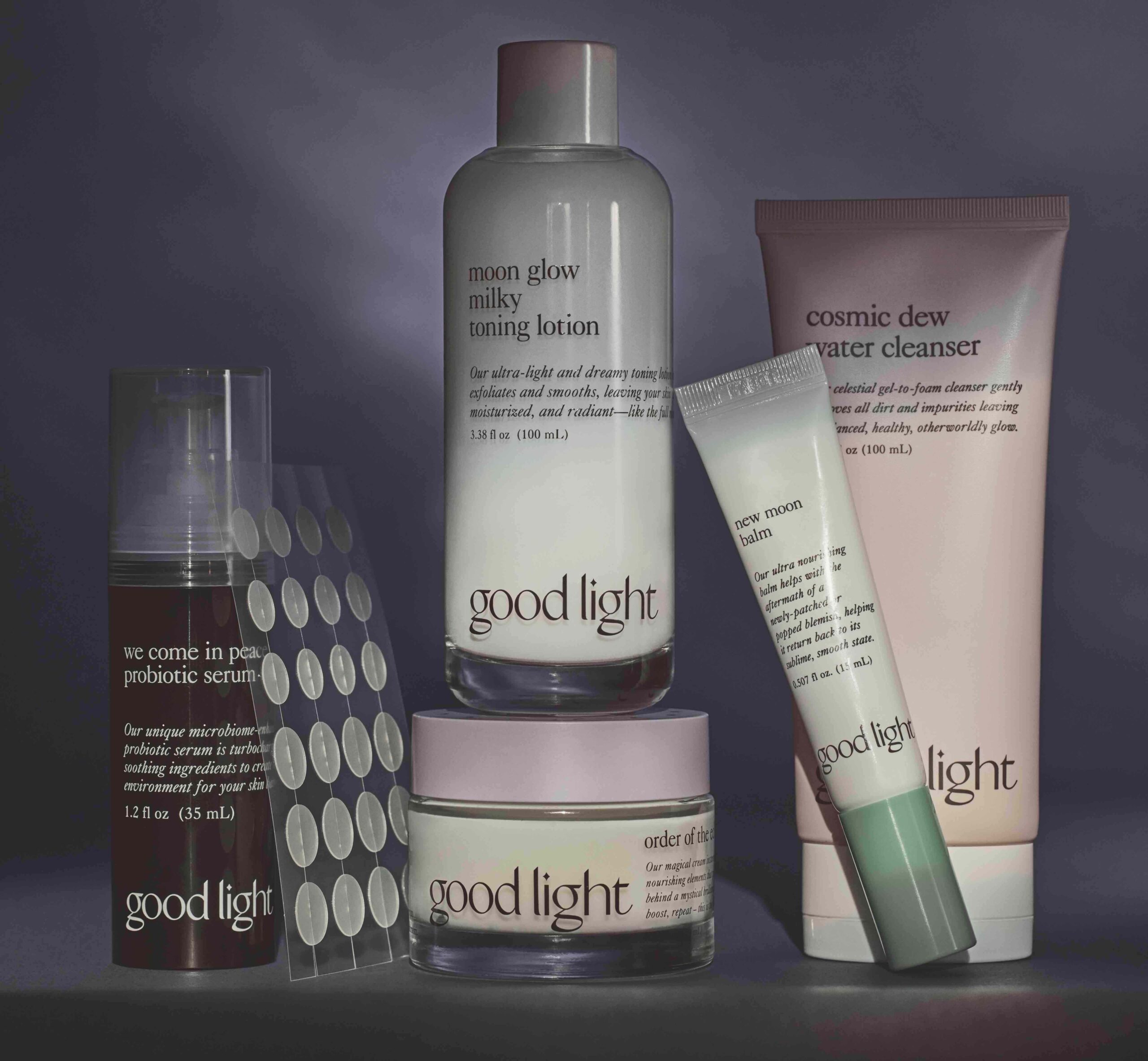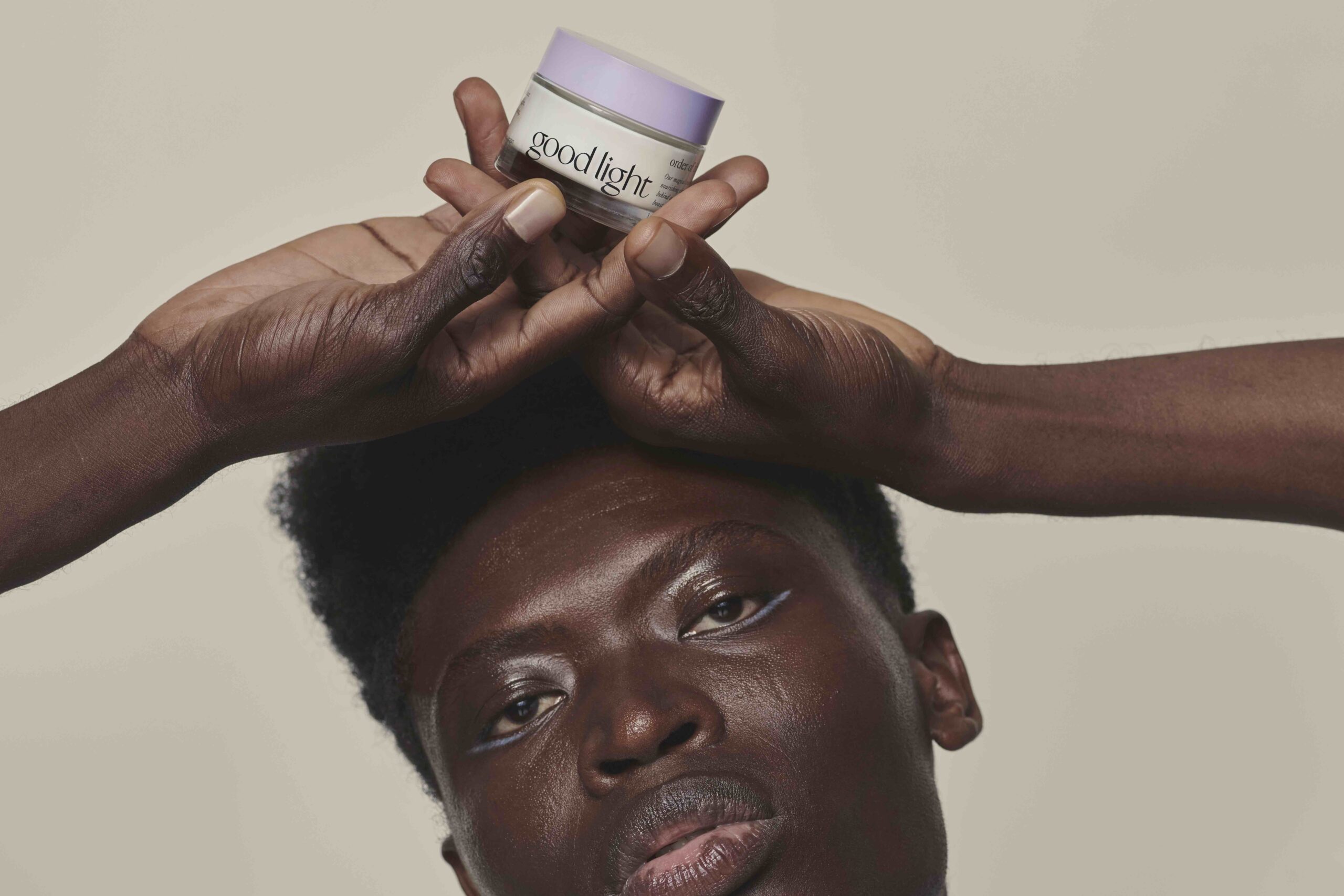
Why Gender-Inclusive Skincare Brand Good Light’s Ulta Beauty Launch Is So Meaningful To Its Co-Founder David Yi
For David Yi, retail placement is personal. A little over a year after its launch, his gender boundary-crossing skincare brand Good Light has rolled out to 733 of Ulta Beauty’s 1,300-plus stores, with the goal of expanding across the chain next year. “From the get-go, we wanted to be at Ulta because it serves real America, and that’s where you can make an impact. When you see ‘beauty beyond the binary,’ at an Ulta store, it makes an impact. If you are a queer person, you feel included in that,” says Yi. “Perhaps your parents or your school doesn’t understand you, but, at Ulta, you know that someone is behind you. In every city across the country, not just the big cities, but smaller ones that are often overlooked, too, we will reach people like me. I wish I had a brand growing up that stood for my values and stood with me.”
Good Light’s success at Ulta and beyond—the brand is carried by Cult Beauty, Morphe, Soko Glam and Thirteen Lune at J.C. Penney, too—will also make an impact on gender inclusivity becoming more broadly accepted in beauty. Consumer demand has been validating its message and model. According to the brand, its sales have skyrocketed 300% year-over-year. Industry sources estimate Good Light is on track to reach around $2.5 million in 2022. The brand declined to specify sales figures. Its bestselling products are Order of the Eclipse Hyaluronic Cream, Moon Glow Milky Toning Lotion, New Moon Balm and Luna Pimple Patches.
Beauty Independent spoke with Yi about his ambitions for Good Light, the eradication of gender norms, the new era of globalization, an underrated K-pop star, Brad Pitt’s controversial skincare line, celebrating his immigrant background and why he opened up about the lowest point in his life.
You established content destination Very Good Light in 2016. How did you think about creating a brand from a content website?
I thought about the beauty brand before the content site. My big picture was OK, if I want to see if this is even viable, if a gender-inclusive brand could work, I always knew community had to come first. We had to look into the data, see where our readers live and ask them about what they wanted from the beauty industry. In 2016, there weren’t as many beauty brands as there are today. It was a slow process to build the brand, creating SEO and searchable terms, and a community for a gender-inclusive brand.
Time and time again, we would turn to the community to ask them, “Hey, is makeup for guys becoming more democratized? Where do you find yourself in beauty stores? Does there need to be a more inclusive aisle?” Even with colors and packaging, we asked them, “Are you really into grays, blacks or blues? Do you like the pinks and the purples?” Every step of the way, the Very Good Light community informed Good Light. To this day, 5% to 10% of our sales come from our Very Good Light community, and they hold us accountable for what they like and don’t like.
What’s something you didn’t know about the beauty industry as a journalist that you now know from being a brand founder?
Being a journalist is so different from being a brand founder. As a journalist, you understand trends and where the industry is heading. I only knew the surface. Now as a founder, there’s so much more that I never knew about. You have to immerse yourself in it so much more, whether it’s taxes, marketing dollars, making sure you have enough cash flow or ensuring you are hiring the exact right people for the roles you need. Thank goodness I have my co-founder and president Michael Engert, who was at Supergoop and has experience growing a brand.
I’m learning so much in the process of being a co-founder and CEO, and humbling myself to really get in the trenches, trying to figure things out and problem-solve on the fly. There’s a lot at stake, people’s jobs are at stake, there are investors, and we have retail partners we want to satisfy. There’s a lot of pressure I didn’t have as a journalist.
You’ve written very emotionally about difficulties you’ve experienced over the past few years. Why?
I’ve been honest every step of the way. That vulnerability can connect you to other people and allow other people to feel less alone. Being a queer Korean American growing up in Colorado Springs, Colorado, it forced me to have empathy for other people and to understand that I deserve to be celebrated and step into my own good light. If the world didn’t embrace me, I had to embrace myself. I’m always going to be truthful, and I’m not going to have an Instagram filter with my light.
I wrote an article in 2018 about suicidal ideation. People were like, “You were just in The New York Times, why is this happening?” Well, I had to move from New York back home to conserve cash. My parents were disappointed in me because they didn’t know what I was doing. It was a low point in my life and career.
I had been so self-sufficient, and I never had my parents help me after college, but I needed to come back home, and I felt like a dog with its tail between its legs. I felt like a failure because I wasn’t able to make Very Good Light an overnight success in three months. The idea of failing my parents made me feel so low and almost helpless.
It was Very Good Light that actually saved me. I was getting so many emails and comments from people saying that Very Good Light saved their lives, or an article made them feel like someone saw them. That was my purpose and what made me get out of bed. Very Good Light and the community really drove me forward, understanding that there was a greater purpose than just me.

How do you talk to retailers about your brand?
We have been very fortunate that, with every retailer conversation, they have been reception about educating themselves on gender inclusivity and what that means. Some people still don’t get it. Ulta absolutely does. When it comes to merchandising, we have to be careful not to be in the men’s section or women’s section. We have to find a place where everyone is welcome, which is why we chose the masstige section at Ulta.
Our brand is a newbie in the industry, and we are so honored to be able to navigate this new terrain, especially with buyers that understood beauty in a traditional way, but are changing. They really are changing in retail. They are celebrating gender inclusivity, and they are understanding they need to pivot or they are going to be behind.
What does “beauty beyond the binary” really look like?
We have been so brainwashed in our understanding that gender and the expression of it has to be a certain way. We are now untethering ourselves from the past and relearning history. We see that social media, especially TikTok, is really driving these conversations and challenging people on their understanding of gender and what comes with it.
We need a multi-pronged approach when it comes to this. We need retailers to get on board and buyers to understand what the movement means. We need things to happen on a policy level. When it comes to gender inclusivity in the retail landscape, that’s just scratching the surface. In every segment of our culture, we are going to see gender inclusivity happening. It’s a movement right now, and it’s only going to grow. We need everyone’s support to make this more normalized and to ensure everyone feels welcome and safe.
Where is this movement going say in 50 years?
In the future, we are going to have to revisit our past. Where do gender roles come from? They came from the 1700s in the Enlightenment when certain men in Europe felt things were too feminine. The gender binary was created to make women or anything quote unquote feminine be perceived as useless in society. Before that, nonbinary folks have been vital partners of their communities, whether it’s the Mahu in Hawaii, Fa’afafine in Polynesia, Bakla in the Philippines or Native American two-spirit people. We are going back to before these gender roles were created for power, mostly for cis straight men to be the ones in power.
I think that we are going back to our nascent selves. That means we are embracing the idea that we can be whoever we want, and we can define our masculinity and femininity. At the end of the day, everyone wants to be who they are authentically without the judgement of society. Where we are headed is that people can just wear what the want and express themselves the way they want without people saying it’s strange. There’s going to be a lot more freedom in the future.
How do you think about being political and running a business?
For me, I’m speaking just on my own behalf. I have never had the privilege of shying away from politics as a person of color and a member of the LGBTQIA community. As a brand, we stand for diversity, equity and inclusion. I’ve been speaking out about that since I was in high school and created the International Diversity Council at my school at a time when it wasn’t popular. I saw an old video of myself in which I say that it’s through our diversity and collective stories that we push through to the future. It’s scary for folks when political things aren’t what they signed up for, but when you take out the politics, we all want the same thing, which is equality for all.
When I look at retailers, I think, “Do you practice what you preach?” The reason we went into a retailer like Ulta is they have so many initiatives for BIPOC folks, and hopefully they will have more initiatives for LGBTQIA folks. It’s essential for me that we are alignment with buyers or investors. I have frank conversations with them. How are you allying with these communities? I will never trade who I am for a spot on the shelf or a check.
What should the beauty industry be doing to support LGBTQIA+ brands and creators more?
There needs to be more initiatives and grant mentorship programs. I would love to see more shelf space. Yes, we are the first gender-inclusive brand at Ulta, but we shouldn’t be and cannot be the last. So, there needs to be endcaps that celebrate gender-inclusive brands or maybe sections that celebrate LGBTQIA founders.
There’s a real opportunity because, as young people are coming into their own sooner because of education and culture moving forward, there’s more of a need, even when it comes to the bottom line. It’s a community they should serve because it’s the right thing to do, but also there are numbers behind it as well.
I feel like we’ve been the underdog in so many ways. In 2019, when I was pitching pre-seed investors with the idea of gender inclusivity, they were like, “We don’t get it. I think it’s too niche. We’re not going to touch that.” I feel like I’ve proven what I believe in. Yes, I was a little ahead of the curve, but, in 2022, society has caught up to this idea of gender inclusivity, and we have proof that this is viable.
What are goals for you as you grow the brand?
We need to go to every touch point to talk about what gender inclusivity means. I want to get to the White House. I want to get into entertainment. I truly want to be a sounding board. My book, “Pretty Boys,” in 2021 was just the start of it. There are so many more opportunities.
We also want a stake in this message internationally. We are in Cult Beauty and are heading to Asia in countries like the Philippines and India. I would love to take this to my parents’ homeland South Korea. There are so many parts of the world where I want Good Light to be a vehicle for change.

When Good Light launched at Ulta, you highlighted your parents’ immigrant story. Why?
Being a product of immigration is my story. My parents came from South Korea with virtually nothing. I think my dad had $100 in his pocket. He started from the bottom. When my parents came here, they didn’t understand the language or culture. They had to leave their families. My parents sacrificed everything so I had the opportunity to dream this big. Going into Ulta and seeing our products on shelf really meant this was real, and it allowed my parents to share in this dream.
Immigrants are what built America. Without immigrants, we wouldn’t have the vibrancy and resiliency of this country. I want to continue the message that being an immigrant is beautiful and empowering. Without my parents being immigrants, I don’t know if I would have the work ethic to go down this path. It’s my parents who first allowed me to have the audacity to have the American dream.
There’s a lot of speculation about the age of American dominance ending and the age of Asian dominance ascending. What do you make of that idea?
When people talk about Chinese dominance or South Korean dominance, it comes with a layer of uncomfortable xenophobia. That is really harmful because of the Asian hate that’s been on the rise. I like to say that we are finally becoming more globalized, and we are seeing that the Western world isn’t the only purveyor of cool. Culture beyond our shores is not only beautiful, but it’s imperative for our cultural growth.
We are seeing this in Korean pop music with Blackpink performing at the VMAs, Korean beauty and Korean dramas. It’s a time right now where we are powerfully seeing that there is a vibrant world outside our own. It’s beautiful to inspire us all to have a global purview and to understand we’re only enriched when we have the ability to see outside of our own purview. We have information that we’ve never had before and that can make us more compelling human beings.
What does the globalization you’re talking about mean for the beauty industry?
The beauty industry needs to hold more space for all of us and not just perhaps one type of consumer. Growing up, I never saw Asian American models in magazines. I hardly saw Asian Americans on TV. Now because of the Asian dollar being sought-after and because of pop culture coming from Asia, luxury brands are capitalizing on it.
Beauty needs to evolve with the time, to be more globalized and diverse, but it has to do that in an authentic way. Yes, you may have more diverse models, and you might purport to care, but how are you really contributing to these communities? Are these community members in your company? Or whose pain are you capitalizing on for your gain? It’s time for more diverse perspectives in the beauty industry. I think we are pivoting in that direction now. I hope it only expands.
Who’s an underrated K-pop star?
BoA. She’s the reason so many female artists could feel empowered to do what they do. She’s the blueprint. BoA deserves all of the recognition because she put K-pop on the map. Her U.S. album that no one listened to was the best album in 2009.
Where do you live mostly now?
I live in Colorado Springs. I came here to finish my book in 2020, and when the pandemic happened, I just stayed here. I don’t know many people here, so I can be as anonymous as I want to be. I’m in LA every month, and I’m in New York every other month, so I feel like a bit of a nomad.
After doing a lot of soul searching, I just decided this is where I want to be for my mental and spiritual health. There are amazing places to hike. I feel like I can have peace and quiet, and do a lot of work without distraction. And there is nothing like being with family. Being with my nephew brings me joy. As my therapist says, self-care is a lot of hard work, and I should never feel guilty about investing in my own well-being.
What is your favorite place for beauty in LA?
I love going to Facile. It’s a facial and aesthetician chain. I love seeing the beauty products they’re stocking. They do such a great curation. Deep in Koreatown, there are some not very popular aesthetician offices that I don’t want anyone to know about, but I frequent them whenever I’m in LA.

Now that you have a brand, do you look at buying beauty products differently?
I know so much more about ingredients now. I know about markups now, and I’m like, “Oh my gosh, why is the one active ingredient listed 18th? That must mean there’s a really small percent of it.” I understand now more what I want to spend on and what I don’t want to spend on. I truly get when something is a marketing campaign and what brands are doing when it comes to their campaigns.
Is there a brand besides your own that you still think is worth investing in?
Amorepacific and Sulwhasoo. My mom saved up money to buy Amorepacific when we were younger. That’s what I still gift my mother with. They are really great products that stand the test of time. They have Korean ingredients like ginseng that are efficacious. I love those products.
What do you make of Amorepacific acquiring its first American beauty brand, Tata Harper?
It’s amazing to see that a Korean company say we are major enough to buy American brands. It kind of reminds me when Hybe, BTS’s record label, acquired an American label. Amorepacific was also an investor in Milk Makeup, and they continue to make investments. I think it’s clear that the Western world isn’t the only one that can create big beauty conglomerates. A lot of acquisitions are going to come from the Eastern world. It’s not creating just trends, but future conglomerates that are here to stay.
What’s your take on Brad Pitt’s brand Le Domaine?
You mean Caudalie part 2. I understand the appeal of the beauty industry with its margins and how popular it is. Celebrities like Brad Pitt and Travis Barker can do whatever they want, but I would also tell them it’s about the intentions behind it. I think consumers today really want a connection. What is your relationship to the industry? There is a level of skepticism as there should be because it’s something that celebrities can use to just cash in on. For Brad Pitt, I would ask, “What is your connection to the beauty industry, and how are you going to connect with it further? What is your authentic enthusiasm for this industry?”
Good Light has raised friends and family funding and a pre-seed round. How do you approach fundraising for the brand?
Funding is interesting because there’s a lot of conversations right now about private equity versus VC. For us, we want to be extremely conscious about who is a stakeholder in our brand. I’ve made it this far without an overwhelming amount of support from the VC community. Now, we can show that we are successful, and we will be a big brand soon. We have really think about who we want to go through that journey with us.
It goes without saying that you have to be careful about who you allow to come to the table and be an extended family member. We are currently in the middle of a seed round, and we welcome those who see us, honor us and are unafraid to move into the future with us.





Leave a Reply
You must be logged in to post a comment.